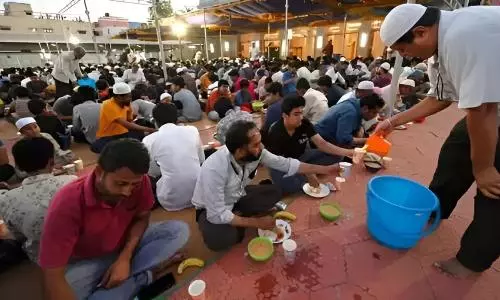
Nipah has fatality rate of 40 to 70%; can spread by droplet: ICMR
text_fieldsNew Delhi: Dr. Rajiv Bahl, the director general of the Indian Council of Medical Research (ICMR), stated on Friday that the fatality rate for the Nipah virus is between 40% and 70% and that it can spread through respiratory droplets.
He stated during a news conference that Covid merely has a "2-3% fatality rate" in comparison.
"Nipah is a zoonotic virus (transmission of virus from animal to humans)," said Bahl noting that "fruit bats are the reservoirs" of the virus.
"It can be spread via droplets, besides blood and bodily fluids," he said.
Despite the high death rate, Bahl said that the virus is not as transmissible as Covid and has small episodes, with maximum cases going up to 100.
Nipah was first recognised in 1999, and since then it has made its mark in four or five countries: Malaysia, Singapore, Bangladesh, the Philippines, and India.
Since 2018, Kerala is currently seeing its fourth outbreak of Nipah. The present cases have been reported about 15 km from where the initial Nipah virus outbreak in the southern Indian state was first identified in Kozhikode in May 2018 and then again in 2021.
In June 2019, a sporadic case of Nipah resurfaced from a geographically different location, at Kochi.
In the latest outbreak, 6 people have been infected with 2 deaths reported.
Bahl said containment is the only strategy, in the absence of any vaccine or medications.
He also noted that India is procuring 20 more doses of monoclonal antibody from Australia. He said that the M102.4 antibody was tested on 14 people globally and found safe, that is no one died, by the University of Queensland in Australia.
It will be administered on "compassionate grounds", as there has been no knowledge of its side effects, and will be decided by the Kerala government and doctors there.
"Currently India has doses for 10 people, we have requested for 10 more people," Bahl said.
Each person requires 2 doses, and so far it has not been administered to anyone in India, he added.
The vaccine was developed by Queensland researchers in 3 batches and stored at minus 80 temperature and is stable for 5 years. India first received the vaccine in 2018, but couldn't use it as the Nipah virus cases died down by then. In addition, the ICMR has also deployed its first mobile BSIII (Biosafety level-3) laboratory in Kozhikode for on-ground testing of the cases.
With inputs from IANS























